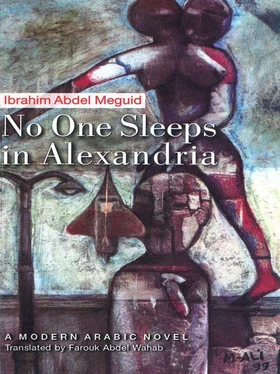Exalt her, glorify her,
Enthrone her in your hearts.
She shines on high.
Her light never sets..

“Al-Safi al-Naim, a man whose name means ‘Pure Bliss,’ cannot but be a reminder of heaven,” said Magd al-Din, addressing a Sudanese soldier as Dimyan stood there, puzzled.
“I thought you were saying that someone had died and moved to the abode of pure bliss,” said Dimyan, and the tall, huge Sudanese soldier laughed, his white teeth sparkling in the light.
A friendship had developed between Magd al-Din and Dimyan and a number of Indian soldiers since the early days of their arrival. When Magd al-Din saw the wall clock in the stationmaster’s room, he had felt confident that he would be able to tell the time of the prayers. But then that same afternoon he had heard the call to the mid-afternoon prayers reverberating in the desert, thin, plaintive, and noble, but he did not know where it had come from. He learned that among the Indian troops were many Muslims and that groups of them frequently came to the station to unload the military equipment from the trains. Magd al-Din found himself standing on the platform at sunset making the call to prayer. He knew that the wind would carry the call to the south, so he intoned in a very loud voice and stood to pray, with Hilal and Amer behind him. The following day an Indian soldier, young with a dark-complexioned, yellowish, square-shaped face and small, gleaming, intelligent eyes, with the traditional Indian turban on his head, came to ask who had made the call to the sunset prayers the previous day. He said that Magd al-Din had a beautiful voice and promised to come at noon to pray behind him. At noon he came accompanied by a number of his merry friends. It was they who were giving large quantities of cookies, chocolate, tea, cheese, corned beef, lentils, and rice to Magd al-Din, Dimyan, Hilal, and Amer. Magd al-Din heard names he had not heard before and stories about a country that he had not believed existed. Everyone knew there is a country called India, but to actually see someone from that country was a real miracle. He came to meet men with names like Muhammad Zamana, Muhammad Siddiqi, Wilayat Khan, Karam Singh, Chuhry Ram, Raj Bahadur, Ghulam Sarwar, Irshad, Jinnah, and Iqbal. They were Muslims and Hindus who could not be more than eighteen, most of them sixteen, mere children, transported by the British Empire to lands other than their own from Peshawar, Lahore, Karachi, Bombay, and Kashmir. No one thought the day they were born that they would be in the Egyptian desert, fighting armies from Europe, and that they would most likely die there.
Amer had entered a state of profound depression, spending the day in the telegraph office tapping his fingers on the table, no one bringing him telegrams to send, receiving telegrams from no one. As for Hilal, he slept most of the time, waiting for passengers, of whom only one or two Bedouin traveled on any given day. But in addition to his work was traffic control and making the ground switches, for there was an old rail line that ended in front of the station, the line on which the military equipment trains spent the night before going back empty the following day. He also had to operate the semaphore, towering its black and white arms as soon as the train moved. He did that from a switch adjacent to the platform. He also had to change the oil in the lamps attached to the rear of the arm of the semaphore once a week and light it every evening. There was a reason for his being there.
Today al-Safi al-Naim joined the Indian soldiers. He came on his own; no one had invited him. He said he heard the call to prayer coming from the direction of the station and was surprised by it. Then he saw the Indians around prayer times sneaking toward the station. So he decided to follow them. It had taken him a long time, but he finally did it.
“You look as though you might be from Sudan,” Dimyan said, laughing.
Magd al-Din smiled in surprise as al-Safi al-Naim said politely, “I am from Omdurman.”
“The kindest people,” said Dimyan. Magd al-Din was still surprised. He was preparing tea on a fire behind the kiosk, which they had left to sit outside near the crossing. He offered a cup of tea to al-Safi, who took one sip and said, “Strong sweet tea!”
“English tea,” said Dimyan.
“No, it’s from Ceylon. The English only package it. But more importantly, it’s made by Arab hands,” said al-Safi al-Naim.
“You are indeed pure bliss,” Dimyan exclaimed like a child, and Magd al-Din laughed happily. Then after some silence al-Safi asked Dimyan his name.
“Dimyan.”
They were silent again as a soft breeze blew. The sun was about to set, letting the dark take charge. The horizon was lit up by the red flames of the twilight. It was the tenth of August, the fifteenth of Rajab, and so the full moon started ascending early. There is nothing more beautiful than the desert in full moonlight.
“Dimyan is a beautiful name, the name of a saint,” al-Safi said.
Dimyan had fallen silent, thinking that his name had shocked al-Safi or rather his religion, but it turned out that he was wrong.
“Thank you, brother,” he said.
A while later Magd al-Din asked him, “Is there a Sudanese group here?”
“A very large group. Can you guess how many?”
“A thousand.”
“No.”
“Five hundred.”
“No. You’ll never guess. I’ll tell you — it’s only two of us, me and Siraj Khalifa. Siraj is in Marsa Matruh, now working in the service of the commander in chief, Mr. Cunningham. I was wondering why the British Empire needed two Sudanese, but now they’ve separated us and I guess now the empire needs each of us far from the other. But wondering doesn’t do me any good. It must be that I’m worth a battalion from New Zealand or India, otherwise they would not have kept each of us away from the other. You’re here alone too. What do you do? Nothing that the army can’t do, but you’re here like us.”
After a long silence during which they finished drinking the tea, Magd al-Din said, “Perhaps we’re here to meet you and get to know you, and that alone gives us happiness and more.”

The desert cold curie with black clouds racing like raging bulls to the cast on the sea and on the land. “So this is where the rain, which comes to Alexandria like the raids, starts,” thought Dimyan to himself, then suddenly asked Magd al-Din, “Who put Alexandria where it is?” Magd al-Din did not reply but looked surprised by his friend’s random question. The soldiers’ uniforms had changed. They now wore long pants and woolen jackets over long-sleeved shirts and thick, knee-high socks and suede boots. They placed rags into the muzzles of their rifles to prevent moisture from the damp desert air getting into them. Tongues of flame shot up here and there in the vast, dark expanse where clouds blocked the moon and the stars. These were fires that soldiers, especially Indians, made from scrap wood and cardboard boxes to keep themselves warm. There seemed to be a state of relaxation on the military front; the trains no longer brought equipment or soldiers from the east, or prisoners of war from the west. Magd al-Din and Dimyan did not see anything new for some time except for a huge Indian, over forty years of age, who walked as haughtily as an elephant and who wore a huge turban. He came several times with the young Indians but did not take part in the prayers, instead sitting at a distance with the few Sikh Indians who had come to the station with their Muslim compatriots. His name was Corporal Bahadur Shand, and he was from Kashmir, where Muslims and Sikhs lived in a state of discord instigated by the English. When Magd al-Din saw Corporal Bahadur he marveled at God’s ability to create all these different nations and peoples. He was reminded of the Quranic verse, And we have made you nations and tribes that you may know one another. He wished he knew enough English and Hindi to understand what was happening in this wide world. How great the Creator who controls all of this and who had sent Dimyan his way to make his days easy, even though he was in a place that even monkeys would flee out of boredom. Dimyan came back every day after Brika’s departure in a state of childlike happiness. With Dimyan it was possible for days to pass; without him, total silence. A month had passed since the Feast of the Virgin, and Ramadan would begin the following day.
Читать дальше













